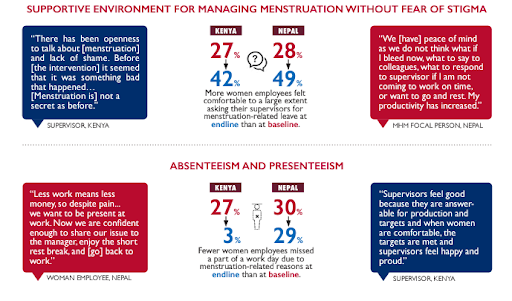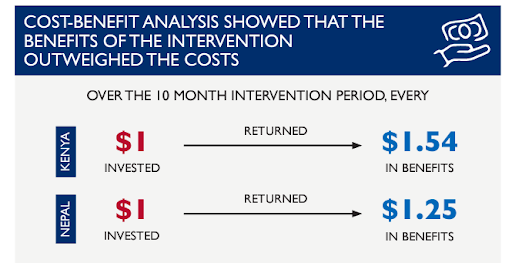#WeAreCommitted: Celebrating Women’s Empowerment on Menstrual Hygiene Day
You want to keep your period a secret so that people do not discuss or gossip about you and people start looking at you funnily. — Textile manufacturing employee, Kenya
Sometimes … it becomes difficult to afford pads. Women would be forced to miss work because the money is spent and there is no money for pads. — Garment manufacturing employee, Kenya
For us, less work means less money, so despite pain and cramps, we want to be present at the work. — Carpet manufacturing employee, Nepal
The experiences of these women illustrate some of the ways employees who menstruate often struggle to manage their periods at work and how those challenges can affect their health and well-being, as well as their work attendance, performance, and earnings.
The women described their experiences in interviews and focus group discussions that were part of action research on menstrual hygiene management conducted by USAID’s Water, Sanitation, and Hygiene Partnerships and Learning for Sustainability (WASHPaLS) project in Kenya and Nepal. The research is one of several examples of USAID’s commitment to empowering women highlighted in this blog as we observe Menstrual Hygiene Day.
Taking action for Menstrual Hygiene Management
WASHPaLS conducted research at four locally owned manufacturing facilities — two in Kenya and two in Nepal. The project worked with these private sector partners to increase access to free menstrual products, improve toilet facilities and waste collection to make them more “menstruation-friendly,” encourage more supportive workplace policies, and provide education about menstruation.
These activities led to increased awareness among all employees that menstruation is a normal biological process and reduced the stigmatization of menstruating employees. “There has been openness to talk about [menstruation] and lack of shame,” a woman supervisor in Nepal said.
After five to nine months of WASHPaLS’ support, more women reported feeling confident about managing their menstruation and always having access to menstrual products. The proportion of female employees who felt comfortable asking supervisors for menstruation-related leave also increased but remained low, at 42 percent in Kenya and 49 percent in Nepal.

Excerpt of a graphic from the Menstrual Hygiene Management in the Workplace Learning Brief. Source: USAID and Iris Group.
In Kenya, the percentage of women who missed part of a workday due to menstruation dropped from 27 percent to just 3 percent. Little change in absenteeism was seen in the Nepalese workplaces, where employees live on site and can make up missed time outside of the usual working hours.
Productivity and “peace of mind”
Employees and supervisors in both countries think that the changes in their workplaces increased productivity. “Supervisors feel good because they are answerable for production and targets,” a Kenyan supervisor explained. “And when women are comfortable, the targets are met.”
A cost-benefit analysis found that every dollar invested in the intervention returned, on average, US$1.40 in benefits. The projected benefits of improved menstrual hygiene management over two years are more than double the cost of providing them ($2.30 for every $1 spent ).

Graphic from the Menstrual Hygiene Management in the Workplace Learning Brief. Source: USAID and Iris Group.
These benefits were driven largely by the provision of free menstrual products and changes in workplace culture — a finding that reflects a Kenyan woman’s explanation for increased productivity among women in her workplace. With a free, reliable source of menstrual products and greater comfort speaking to supervisors and fellow employees about menstruation, she said, “We are feeling a sense of peace of mind.”
Empowering women
The WASHPaLS action research generated recommendations, lessons, and research priorities to inform future efforts to empower women in the workplace through improved menstrual hygiene management. That commitment to gender equality and women’s empowerment is a hallmark of USAID-supported initiatives, including the following:
- H20 Maghreb, an innovative demonstration project designed to equip Morocco’s next generation of water technicians to address the challenge of water scarcity, has led the way in boosting women’s employment in the traditionally male-dominated water and sanitation sector. Of the 112 young people who enrolled in the project’s six-month training course in sustainable water management from 2019 to 2022, 76 percent were women; to date, about 63 percent of the women trainees (and 79 percent of those who were trained and found jobs before the COVID-19 epidemic depressed hiring) are employed in the sector.
- Engendering Industries is expanding beyond the energy sector, where it began in 2015, to partner with water utilities to increase women’s participation and create more equitable workplaces. Working with about 41 organizations in 27 countries, Engendering Industries uses an evidence-based approach to help industry partners expand job opportunities for women, enhance capacity through the Gender Equity Executive Leadership Program, and adopt policies and procedures that foster gender equality.
- The Women + Water Alliance empowers women and their communities to improve access to clean water and sanitation in two Indian states touched by the apparel industry. Through GAP Inc.’s Personal Advancement and Career Enhancement (P.A.C.E.) program, more than 162,000 women have learned about potable water management, handwashing, and menstrual hygiene. Their stronger communication and financial literacy skills enable them to obtain affordable financing for piped water access and upgraded toilets and to advocate for local water access plans.
By Kathleen Shears, Science Writer, FHI 360. FHI 360 is a partner on the Global Waters Communication and Knowledge Management Activity supported by USAID’s RFS Center for Water Security, Sanitation, and Hygiene.
Related Resources:


